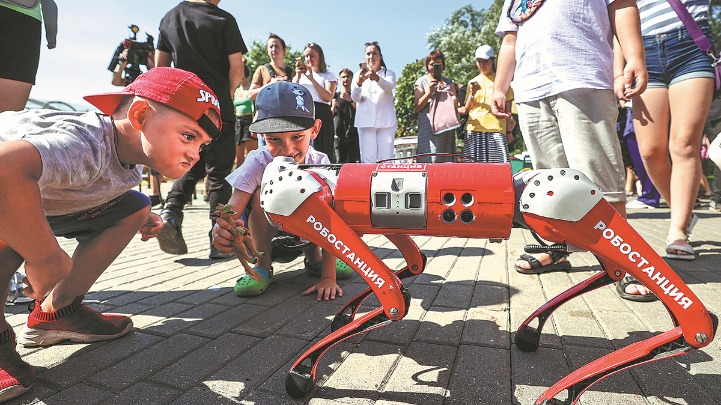Sino-Russian science cooperation has become more profound and pragmatic with the help of scientific communities from both countries. Both countries have launched a roadmap for China-Russia cooperation in science, technology, and innovation from 2020 to 2025, encouraging joint research in various fields, including computer science, artificial intelligence, mathematics, physics, materials science, astronautics, energy-saving, and environmental protection technologies. In addition, academic exchanges and talent training have yielded concrete results. To deepen their cooperation, experts recommend that nongovernmental organizations from both countries promote academic exchanges, bolster people-to-people relations, and launch new joint platforms to support research projects and the industrialization of scientific findings. Furthermore, China and Russia should increase collaboration in mathematics, basic algorithms, artificial intelligence, and industrial software to increase the competitiveness of digital economies in both countries.
China and Russia have a long-standing relationship in science and technology that spans several decades. Experts have suggested that the two countries can benefit from their complementary strengths in the field by cooperating to fulfill their strategic needs and tackling global and regional challenges. They believe that nongovernmental organizations should play a more prominent role in promoting academic exchanges and supporting research projects.
Both countries have launched a road map for China-Russia cooperation in science, technology, and innovation from 2020 to 2025. The framework encourages joint research in various fields, including computer science, artificial intelligence, mathematics, physics, materials science, astronautics, energy-saving, and environmental protection technologies.
Academic exchanges and talent training have also yielded concrete results. In 2019, Tsinghua University and Saint Petersburg State University founded the Tsinghua University Russian Institute, and a year later, Peking University and Moscow State University established the Sino-Russian Mathematics Center in Beijing.
Russian scientists find China’s work environment and its ability to transform scientific findings into new technology and products attractive. They are hopeful that President Xi Jinping’s visit to Russia will promote further development of both countries. Skopintsev, a professor at Moscow Polytechnic University, said he is positive about China-Russia cooperation in science and technology and hopes more Chinese and Russian students will learn from each other.
According to the journal Nature, China has become one of Russia’s top academic partners in recent years, publishing around 17% of Russia’s international co-authored papers last year, nearly double compared with about 9% in 2012. By leveraging their strengths, China and Russia can improve the well-being of their peoples and jointly tackle global and regional challenges with more innovative solutions.
To deepen their cooperation, experts recommend that nongovernmental organizations from both countries promote academic exchanges, bolster people-to-people relations, and launch new joint platforms to support research projects and the industrialization of scientific findings. As they continue to deepen their relationship, China and Russia will undoubtedly create new opportunities for global innovation and progress.
Sino-Russian science cooperation has become more profound and pragmatic with the help of scientific communities from both countries, according to Ding Zhifeng, executive president of the Beijing Global Talent Exchange Association and director-general of the China Center of the Russian Academy of Engineering. Since 2020, the Russian Academy of Engineering has welcomed 30 new Chinese engineers as its “foreign academicians,” granting this prestigious title to noted engineers from some 20 countries, including former and current presidents of the Chinese Academy of Engineering.
The China Center of the Russian Academy of Engineering has launched nine China-Russia expert committees, comprising over 300 specialists in key scientific areas, including aerospace engineering, integrated circuits, and carbon technologies. The center has facilitated the establishment of 47 international innovation centers and joint research institutions.
Ding said that top scientists and engineers could play a crucial role in deepening Sino-Russian cooperation and in the industrialization of scientific and technological discoveries. He added that China and Russia should support nongovernmental organizations and private companies to engage in bilateral science cooperation, such as establishing field-specific collaboration platforms and innovation centers, joint programs for nurturing young talents, and high-level academic forums.
Professor Wu Daming of Beijing University of Chemical Technology and a foreign academician at the Russian Academy of Engineering said that China and Russia complement each other well in science, technology, and economy. Russia has a long history of excellence in basic sciences, including mathematics, physics, materials science, and chemistry. Meanwhile, Chinese industrial and manufacturing sectors offer a massive market for Russia to resolve consumer tech products and market size issues.
Russian engineering is globally famous for its durability and reliability, and Russian engineers excel in many strategic sectors, such as aerospace engineering, nuclear technology, and civil engineering. Wu believes that China’s attachment to basic sciences creates new opportunities for collaboration. By working together, scientific and technological collaboration can improve the innovation capabilities of both countries, promote socioeconomic development, and deepen mutual friendship and public relations. These endeavors will facilitate the development of Sino-Russian comprehensive strategic partnership of coordination in the new era.
Professor Wang Lijun from North China University of Technology and a foreign academician at the Russian Academy of Engineering suggests that China and Russia should collaborate in mathematics, basic algorithms, artificial intelligence, and industrial software to increase the competitiveness of digital economies in both countries. According to him, China has robust digital industry and infrastructure, while Russia excels in basic research and foundational algorithms. By combining the hardware advantages of China with the software strengths of Russia, they will overcome bottleneck issues and create innovations that benefit people from both countries and the world.
Don’t miss interesting posts on Famousbio

